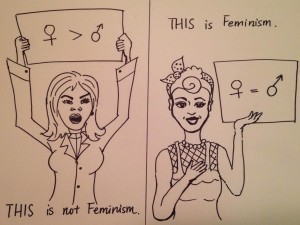Feminist shaming in media needs to stop
When Kaley Cuoco, star of the popular television series, The Big Bang Theory, told Redbook Magazine in December that she did not consider herself a feminist, it sparked major controversy. In the magazine, Cuoco said, “I was never that feminist girl demanding equality. But maybe that’s because I’ve never really faced inequality.”
Grace Wang | Daily Trojan
Even though Cuoco later apologized on her Instagram for the statement, saying her words were “taken out of context,” followers accused her of not understanding the definition of the concept, one that is rooted in gender equality.
Cuoco seems to be one of many female celebrities who have publicly abandoned the word “feminism.” Actress Shailene Woodley, an advocate, according to Time, for movies empowering women, said she is not a feminist because she “love[s] men.” Time also reported others agreeing with Woodley. Kelly Clarkson and Carrie Underwood, both think feminism is an aggressive independence. As a nod to this issue, Time recently included feminist on its list of words to ban for 2015 (though they later apologized) because it has become an annoyance to hear celebrities state their opinion on the word.
What these female stars have failed to consider is that feminism comes with a simple explanation, one that they are complicating. The more coverage that emerges surrounding celebrities’ explanations for rejecting such a belief builds a stigma around the term. According to Salon, a study found its 228 American participants associating feminism with negative adjectives like “man-hating” and “unhygienic,” a view fueled by the portrayal by these female celebrities. The truth about feminism could not be further from this picture. Feminists are simply people who believe that men and women should be treated equally and fairly within society and under the law.
Cuoco, by saying that she has never experienced gender-based rejection, made a selfish move by ignoring the millions of women across the globe who do experience discrimination based on their sex. According to Equality Now, in 2012, 20.9 million people were sold into forced labor or sex slavery, of which 98 percent are female victims. Lack of access to reproductive health resulted in 12 percent of unwanted pregnancies and 289,000 childbirth deaths in 2013. And though organizations like Amnesty International are trying to stop sexual abuse, millions of women are raped and beaten on a daily basis. This is the reality that stands next to Cuoco’s inexperience. To disown feminism is to disown any kind of support or empathy for the millions of women who suffer from gender inequality. To disown feminism is to accept ignorance of issues that so obviously plague the world.
Ultimately, the problem with extensive media coverage of celebrities and organizations disowning feminism is the universal refusal to acknowledge the truth about gender inequality; it exists, and feminists want to fix it. Twisting feminism into a negative belief only isolates those affected by gender inequality; people who feel great effects of the words of celebrities.
A woman who claims she is not a feminist because she has never experienced inequality is as ludicrous as someone who refuses to acknowledge global warming because he or she has never experienced higher than average temperatures. They bludgeon a term that has been used to describe the crusade against gender injustice. Feminism, in turn, has been reduced to a debate about the righteousness of being a housewife and the desire for female dominance.
As Alice Paul, a feminist who nearly died for the right to vote, once said, “I never doubted that equal rights was the right direction. Most reforms, most problems are complicated. But to me there is nothing complicated about ordinary equality.” There is a social responsibility to women suffering around the world to simplify the conversation about feminism. The trivialization of a term could very well cost society its empathy towards all women affected by gender inequality.

